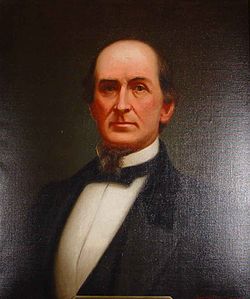November 6, 1865 | |||||||||||||||||||||
| Turnout | 4.73% | ||||||||||||||||||||
|---|---|---|---|---|---|---|---|---|---|---|---|---|---|---|---|---|---|---|---|---|---|
| |||||||||||||||||||||
 County results Patton: 40–50% 50–60% 60–70% 70–80% 80–90% >90% Bulger: 50–60% 60–70% 70–80% 80–90% Smith: 40–50% 50–60% 60–70% 70–80% 80–90% | |||||||||||||||||||||
| |||||||||||||||||||||
| Elections in Alabama |
|---|
 |
The 1865 Alabama gubernatorial election took place on November 6, 1865, in order to elect the governor of Alabama. Whig Robert M. Patton won with a narrow plurality of the votes, beating Democrat Michael J. Bulger by about 4,000 votes.
This was the last time a Whig won any election in US history.


